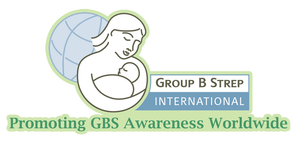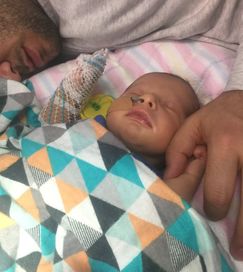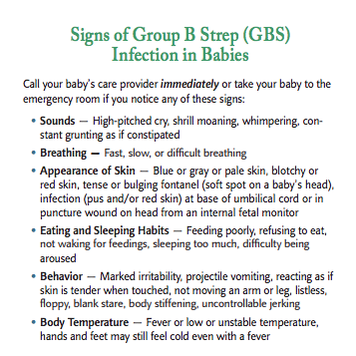Sebastian’s Story:
I wasn’t sure if I wanted to share this on social media for so long, but after seeing a number of babies die from GBS simply due to lack of awareness around the infection I thought I should share our story.
Sebastian contracted late-onset Group B Strep (GBS) at 10 days old. GBS is the number one killer of infants worldwide. Late-onset GBS disease occurs in babies over 1 week of age up to several months old. Babies can become infected with GBS by sources other than the mother. There are currently no prevention protocols in place to help prevent late-onset GBS disease.
However, being able to recognize the symptoms of GBS infection in babies is imperative for prompt medical treatment for better outcomes. GBS is a very fast-acting type of bacteria and an otherwise healthy-appearing baby can become critically ill within a matter of hours. (Group B Strep International)
In our case it all happened super fast. Sebastian woke up that morning right on schedule to feed, I breastfed him and changed him and we headed out for my postnatal physiotherapy appointment. We arrived and Sebastian was having his morning nap. At the end of my appointment Sebastian was due for his next feed, but didn’t wake up for it like usual. Because he was born early and lost too much weight in the hospital I had to ensure he ate every 3 hours. (This routine ultimately could have been what saved him.) I picked him up to feed him and he unleashed a high pitch scream I’d never heard my tiny baby do before.
This scream was so ear piercing, but his eyes remained closed. I tried to latch him to my breast but he wouldn’t suckle. I had packed a bottle of expressed breast milk also - as this was one of the first times I’d taken him out and I wasn’t sure how he would feed - so I tried feeding him that, but he also wouldn’t take that. Anthony and I headed to the car and tried again, his eyes still firmly shut and he was still screaming.
I automatically thought there was something wrong with my baby, but Anthony comforted me and expressed that babies cry sometimes and it is the first time we have taken him out so maybe we should get him home and do some things we know settle him. He nodded off again in the car but was making strange grunting sounds. As soon as we got him home, we checked his temperature which was fine; so we tried everything - feeding / bathing / swaddling all the things that usually calmed him down and nothing worked. He just kept stiffening up plus either screaming or grunting and keeping his eyes shut.
We had no idea what these symptoms were and what they meant - no one had explained what to look out for. We weren’t even aware of late-onset GBS. In the hospital I was given antibiotics during labour and Sebastian was monitored for 48 hours post birth to look out for early-onset GBS - all results came back fine, so we thought he was all clear. (I have attached in the images a list of symptoms of GBS infection in babies to make more people aware of them).
After none of our efforts to settle him worked, I was adamant my baby needed medical assistance. We took him to the gp’s office who assessed him and said he had a mild fever and a rigid stomach. He said we should take him to the emergency department for further assessment. We rushed straight to emergency and were taken straight in - at this point Sebastian started to go really stiff, and started vomiting up green bile. He was also still screaming in pain. The doctors decided to give him some pain killers through a drip to ease his pain.
At this point they checked his temperature again and it was now at 39 degrees. The doctors informed us they were now going to have to work fast and do some pretty invasive tests - spinal tap, bloods, insert tubes down his nose to his stomach to gain bile samples, tubes into his penis to gain urine samples as he wasn’t going to the bathroom due to lack of fluid intake. All of which was too much for me. I broke down but my husband remained strong and was there by his side the entire time. I don’t know how I would’ve coped without him.
The tests continued and results were inconclusive. They sent the spinal fluid away for testing. They ran ultrasounds and CAT scans - it was decided we would be sent to Westmead Children’s for a specialist opinion - as the doctors were thinking it could be twisted intestines.
Before we left Gosford hospital for Westmead though, one paediatrician decided he wanted to start Sebastian on a course of antibiotic drip just incase. Ultimately he believed it wouldn’t hurt - and we are so lucky he did, without it, our little boy could have developed meningitis and have severe delays or even worse - not have made it home.
Sebastian’s first trip to Sydney was then in an ambulance. My tiny baby on this massive stretcher bed. We arrived at Westmead and the tests continued with surgeons on stand by. He was injected with dye and put through CT, with his intenstines coming back clear. He still wasn’t eating and was still having high temps - no one could figure out the symptoms. Two days later - the cultures came back that were sent off - he had late-onset GBS. We were sent back to Gosford for monitoring and recovery for 7 days. I was allowed to feed him again and we would just have to wait and see how he recovered to see if their was any lasting damage.
We were so lucky the paediatrician on call decided to start antibiotics early on a hunch - this is ultimately what stopped the infection spreading further.
This experience was so scary for our little family, and I would hate to see anyone else go through this. We were told we were so lucky we brought him in when we did or our outcome could have been devastating. Look out for the signs, trust your instincts, as early detection is paramount in making the difference between life and death when it comes to Late-onset GBS.
-Haley Vallone
I wasn’t sure if I wanted to share this on social media for so long, but after seeing a number of babies die from GBS simply due to lack of awareness around the infection I thought I should share our story.
Sebastian contracted late-onset Group B Strep (GBS) at 10 days old. GBS is the number one killer of infants worldwide. Late-onset GBS disease occurs in babies over 1 week of age up to several months old. Babies can become infected with GBS by sources other than the mother. There are currently no prevention protocols in place to help prevent late-onset GBS disease.
However, being able to recognize the symptoms of GBS infection in babies is imperative for prompt medical treatment for better outcomes. GBS is a very fast-acting type of bacteria and an otherwise healthy-appearing baby can become critically ill within a matter of hours. (Group B Strep International)
In our case it all happened super fast. Sebastian woke up that morning right on schedule to feed, I breastfed him and changed him and we headed out for my postnatal physiotherapy appointment. We arrived and Sebastian was having his morning nap. At the end of my appointment Sebastian was due for his next feed, but didn’t wake up for it like usual. Because he was born early and lost too much weight in the hospital I had to ensure he ate every 3 hours. (This routine ultimately could have been what saved him.) I picked him up to feed him and he unleashed a high pitch scream I’d never heard my tiny baby do before.
This scream was so ear piercing, but his eyes remained closed. I tried to latch him to my breast but he wouldn’t suckle. I had packed a bottle of expressed breast milk also - as this was one of the first times I’d taken him out and I wasn’t sure how he would feed - so I tried feeding him that, but he also wouldn’t take that. Anthony and I headed to the car and tried again, his eyes still firmly shut and he was still screaming.
I automatically thought there was something wrong with my baby, but Anthony comforted me and expressed that babies cry sometimes and it is the first time we have taken him out so maybe we should get him home and do some things we know settle him. He nodded off again in the car but was making strange grunting sounds. As soon as we got him home, we checked his temperature which was fine; so we tried everything - feeding / bathing / swaddling all the things that usually calmed him down and nothing worked. He just kept stiffening up plus either screaming or grunting and keeping his eyes shut.
We had no idea what these symptoms were and what they meant - no one had explained what to look out for. We weren’t even aware of late-onset GBS. In the hospital I was given antibiotics during labour and Sebastian was monitored for 48 hours post birth to look out for early-onset GBS - all results came back fine, so we thought he was all clear. (I have attached in the images a list of symptoms of GBS infection in babies to make more people aware of them).
After none of our efforts to settle him worked, I was adamant my baby needed medical assistance. We took him to the gp’s office who assessed him and said he had a mild fever and a rigid stomach. He said we should take him to the emergency department for further assessment. We rushed straight to emergency and were taken straight in - at this point Sebastian started to go really stiff, and started vomiting up green bile. He was also still screaming in pain. The doctors decided to give him some pain killers through a drip to ease his pain.
At this point they checked his temperature again and it was now at 39 degrees. The doctors informed us they were now going to have to work fast and do some pretty invasive tests - spinal tap, bloods, insert tubes down his nose to his stomach to gain bile samples, tubes into his penis to gain urine samples as he wasn’t going to the bathroom due to lack of fluid intake. All of which was too much for me. I broke down but my husband remained strong and was there by his side the entire time. I don’t know how I would’ve coped without him.
The tests continued and results were inconclusive. They sent the spinal fluid away for testing. They ran ultrasounds and CAT scans - it was decided we would be sent to Westmead Children’s for a specialist opinion - as the doctors were thinking it could be twisted intestines.
Before we left Gosford hospital for Westmead though, one paediatrician decided he wanted to start Sebastian on a course of antibiotic drip just incase. Ultimately he believed it wouldn’t hurt - and we are so lucky he did, without it, our little boy could have developed meningitis and have severe delays or even worse - not have made it home.
Sebastian’s first trip to Sydney was then in an ambulance. My tiny baby on this massive stretcher bed. We arrived at Westmead and the tests continued with surgeons on stand by. He was injected with dye and put through CT, with his intenstines coming back clear. He still wasn’t eating and was still having high temps - no one could figure out the symptoms. Two days later - the cultures came back that were sent off - he had late-onset GBS. We were sent back to Gosford for monitoring and recovery for 7 days. I was allowed to feed him again and we would just have to wait and see how he recovered to see if their was any lasting damage.
We were so lucky the paediatrician on call decided to start antibiotics early on a hunch - this is ultimately what stopped the infection spreading further.
This experience was so scary for our little family, and I would hate to see anyone else go through this. We were told we were so lucky we brought him in when we did or our outcome could have been devastating. Look out for the signs, trust your instincts, as early detection is paramount in making the difference between life and death when it comes to Late-onset GBS.
-Haley Vallone
To learn more about Perinatal & GBS Misconceptions, click HERE.
To learn more about the Signs & Symptoms of Preterm Labor, click HERE.
To learn more about the Signs & Symptoms of GBS Infection, click HERE.
To learn more about Why Membranes Should NOT Be Stripped, click HERE.
To learn more about How to Help Protect Your Baby from Group B Strep (GBS), click HERE.
To learn more about the Signs & Symptoms of Preterm Labor, click HERE.
To learn more about the Signs & Symptoms of GBS Infection, click HERE.
To learn more about Why Membranes Should NOT Be Stripped, click HERE.
To learn more about How to Help Protect Your Baby from Group B Strep (GBS), click HERE.


